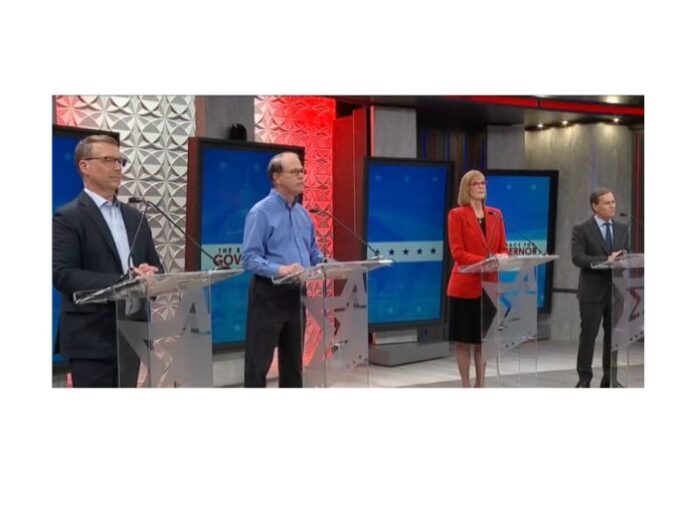
Leslie Bonilla Muniz
Indiana Capital Chronicle
INDIANAPOLIS — Four GOP candidates for governor made time to call each other out while highlighting signature campaign planks during a Tuesday evening debate.
U.S. Sen. Mike Braun, Brad Chambers, Lt. Gov. Suzanne Crouch and Eric Doden traded jabs in front of the cameras at the event, hosted by FOX59/CBS4. Two other candidates didn’t make the cut.
The debate featured queries aimed at specific campaigns sandwiched in between nine questions for the whole group. The candidates graded Gov. Eric Holcomb’s time in office, pledged to maintain in-vitro fertilization (IVF) access and weighed in on marijuana.
It concluded with a round of light-hearted rapid-fire questions and closing statements.
Going after Braun
Multiple gubernatorial candidates knocked Braun — the only candidate with congressional experience — for national immigration woes. Braun has held his post in the U.S. Senate since 2019; before that he served in the Indiana House of Representatives.
Asked if they’d send Indiana soldiers to the U.S.-Mexico border should a reelected President Donald Trump request it, all four said they would.
Chambers took the opportunity to assert that the federal government — including Braun — had failed Hoosiers.
“On Sen. Braun’s watch, 7 million people have come over the border illegally,” Chambers said. “The front door of our country is closed (but) the back door is slapping wide open, and he has not … led on one bill to address this.”
Doden also critiqued Braun for traveling to the border and shooting a campaign advertisement there.
All but Doden were clear they’d also deport migrants. Crouch, in particular, vowed to deport them to so-called sanctuary cities outside Indiana. She also took credit for new Hoosier restrictions on land purchases by “adversaries.”
Braun said Chamber’s argument was “naïveté” and said a Democrat would’ve had to take the lead on immigration restrictions for such proposals to get past the Democrat-led U.S. Senate.
Chambers separately jabbed at Braun, accusing the senator of changing his position on qualified immunity for law enforcement officers and for comments made to popular conservative show host Tucker Carlson that appeared supportive of Black Lives Matter.
Braun said he no longer wanted to alter qualified immunity after listening to officers, and said his comments had been taken out of context.
“That reference, that was to somebody exercising their First Amendment rights,” he said. “(I) was never going to ever support a radical crazy group like the umbrella group BLM.”
Braun also recently picked up the endorsement of the Indiana State Police Alliance.
Attacks on economic development leaders
Braun, meanwhile, took on Chambers and Doden for their respective records while running the Indiana Economic Development Corporation. Chambers served in the role from 2021 to 2023, when he stepped down to run for governor, and Doden from 2013 to 2015.
“This guy over here has been with his fat cat buddies,” Braun said of Chambers, observing that one supporter from homegrown pharmaceutical giant Eli Lilly donated $100,000. He and Doden also said the IEDC under Chambers had focused too many resources on large projects.
“Competition, transparency, spread the wealth on economic development. That’s not been occurring under his regime,” Braun said.
Chambers defended his tenure with the IEDC, noting “record results, higher wages, investments all over the state. So, I am flattered the business community supports my campaign.”
Chambers added the IEDC puts its data into a publicly available portal and offers performance-based incentives.
Braun also accused Doden of shady dealings.
“When he was involved in economic development, he had issues where he wasn’t actually doing things to help small towns,” Braun said. “He was maybe trying to help his own friends and business. (Doden) got an ethics watch about it and ignored it four times.”
Doden, meanwhile, critiqued Chambers’ IEDC for spending billions on an Innovation District in Lebanon that is expected to require significant water from another part of the state.
“The IEDC needs to go back to its roots, where we had it when I was running it — where it served all 92 counties, where … we were not trying to buy property,” Doden said. “We were not trying to … draw water away. We were not spending billions of dollars in one county. We were serving the entire state.”
Candidates highlight signature proposals
Crouch, meanwhile, took more heat for her plan to ditch Indiana’s income tax. It’s worth about $8 billion annually.
“I think it’s inappropriate for a governor to make a promise that they can’t keep — our income taxes cannot be axed,” Doden said. “… We need to work with the General Assembly to make sure that we lower taxes as much as possible in a fiscally responsible way.”
Crouch ribbed Doden for having “selective hearing.”
“I said it can’t happen overnight. It has to be phased in,” she said. “… But we can do it if we phase it in, and take excess surpluses and revenues and put them towards eliminating that income tax — putting money back into your pockets every single year.”
Crouch also again called for independent audits of most major state agencies, and specifically for IEDC and the Family and Social Services Administration (FSSA). She flamed the latter for its infamous $1 billion Medicaid forecasting error, which has jeopardized funding for parental care of medically complex kids.
Doden, meanwhile, repeatedly referred to his plans for zero-cost adoptions and to restore small Hoosier communities.
Braun and Chambers highlighted their business experience, with Braun also emphasizing his “proven record in the Senate for effectiveness.”
Candidates talk Holcomb, marijuana and IVF
Moderators asked each candidate to give the term-limited Holcomb a grade on his tenure as governor.
Braun offered a B-. He said Holcomb’s economic development efforts were “okay” but that he hadn’t “seen a lot of improvement” on the state’s education and workforce crises.
Chambers gave his former boss an A, saying Holcomb “has tackled some real issues.” He supported funding boosts for law enforcement and public health, and said he was “super proud” of the state’s economic growth.
Crouch was the most critical, with an A and a C. She said pandemic-era restrictions had increased rates of anxiety and depression among Hoosiers, and particularly for young people.
Doden declined to grade the outgoing governor, saying he preferred to focus on the future.
The candidates also differed on whether Indiana should legalize marijuana, a move Holcomb has firmly resisted. Braun, Chambers and Doden said they were open to medicinal marijuana, but Crouch said she opposed legalization of “another drug,” citing mental health concerns.
All candidates agreed that Indiana should maintain access to IVF fertility treatments.
Alabama’s top court recently ruled that frozen embryos should be considered people, halting fertility treatments in that state until Gov. Kay Ivey signed a law shielding IVF providers from liability.
“As a pro-life candidate, I think we have to protect life but we also have to promote life. I believe that families in Indiana should should have access to IVF,” Chambers said.
“It’s very clear: if you believe in the sanctity of life, you should treat living embryos with respect. When you try to say is it a living child, I think that is where you get into discussions, even when you say you’re pro-life,” Braun said.
Crouch said she’d “protect life, but also protect the rights of these women and these couples to be able to bring a precious life into this world.” Doden agreed and said he’d improve adoption and implement a fund to help adoptive parents cover expenses.
Several candidates missing
To debate Tuesday, candidates needed to have raised at least $100,000 and received at least 5% on a poll question that includes all party-aligned candidates in a primary, according to Nextar’s debate criteria.
Republicans Curtis Hill and Jamie Reitenour didn’t meet those standards. Reitenour lambasted the network for leaving her off the stage in a news release last week, noting that Nextar’s contracts say it can modify criteria “if there is a strong public interest rationale.”
Crouch and other candidates previously called to allow all candidates the opportunity to debate.
GOP candidates will again meet on stage in a Wednesday debate televised by WISH-TV. Hill qualified, but Reitenour did not due to low fundraising.
Indiana Democratic Party Chair Mike Schmuhl criticized the debate candidates for providing “talking points, but few real solutions” in a news release Tuesday. So did Jennifer McCormick, the only Democrat on the primary ballot.
“Tonight, Hoosiers watched as candidates for Governor spent 60 minutes catering to the most extreme voices in their party and ignored the kitchen table issues that actually matter. It was sad, and I know Indiana can do better,” she said.
To win in the May 7 primary, a contender only needs to gain the majority vote over the other Republicans — not a plurality of over 50% — to win. McCormick and Libertarian Donald Rainwater face no primary opposition.




